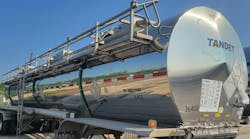A STUDY published in January seems to suggest that terrorists could be targeting gasoline and propane shipments in the United States. Requested and funded by the Department of Homeland Security (DHS), the study has created a bit of a stir in the emergency responder community and among some tank truck carriers.
Entitled “Potential Terrorist Uses of Highway-Borne Hazardous Materials,” the report was developed by the Mineta Transportation Institute's National Transportation Security Center of Excellence (MTI's NTSCOE). It was written by Brian Michael Jenkins and Bruce R Butterworth.
“We consider gasoline tankers, and to a lesser extent, propane tankers to be the most attractive options for terrorists seeking to use highway-borne hazmat, because they can create intense fires in public assemblies and residential properties,” says Jenkins, director of MTI's NTSCOE. “We strongly urge DHS, state governments, and industry to take a renewed look at flammable liquids as a weapon of opportunity and at a strategy to improve security measures and technology.”
The peer-reviewed report reportedly came from a review of terrorist objectives, hazardous materials, and potential targets. The report concludes that terrorists most often seek soft targets that yield significant casualties. The report claims that terrorists prefer attacking public buildings and assemblies.
Terrorists more often choose simple operations promising modest consequences rather than complex and uncertain operations promising catastrophic results, according to the MTI NTSCOE study. Terrorists reportedly have discussed substituting fire for harder-to-acquire explosives. Gasoline tankers reportedly have greater appeal in the United States because they can easily produce intense fires, operate in target-rich environments with predictable routes, and pose few security challenges.
The study calls on government officials to focus more anti-terrorism attention on the fuel logistics sector. It recommends better coordination between federal and state officials, stronger hazmat security measures in the field, and mandating vehicle tracking technologies, panic alarms, and immobilization capabilities for vehicles transporting certain hazmat cargoes — specifically gasoline.
So what does this really mean for the tank truck industry? First of all, the report is long on international terrorist generalities and short on documented threats to US gasoline and propane haulers.
There is really nothing in the report that is news to the tank truck industry, according to John Conley, president of National Tank Truck Carriers. “Perhaps the biggest impact could be from the media and perhaps from shippers wanting to know what the industry is doing about security,” he says. “We do have to be constantly aware that the materials we haul could be used by bad people to do bad things. That is hardly a new concept. We have delivered over 50,000 loads of gasoline a day since the attacks of 9/11 with no use of a tank truck in a terrorist attack (within the United States). Nevertheless, we will have to continue to be vigilant.”
Conley's comments are echoed in a letter that a New England fuel hauler sent to its drivers. The letter states: “The takeaway from the report is that ‘recent assessments suggest that terrorists are considering how to weaponize gasoline tankers.’ Basically, there are 19 million truckload shipments of gasoline in the United States annually. This information is nothing new to our industry. We have our security plans in place. However, the security of the load you are transporting rests with you, our professional driver.”
Secondly, the study does contain one glaring error, according to Conley. It says a gasoline tanker could be missing a few days before the loss would be known. That simply is not the case for US fuel haulers, most of them run fleet ratios of one trailer per tractor, and the equipment runs on very tight schedules.
Thirdly, the study seems to be laying the foundation for DHS to mandate a wide range of costly security technologies. “I'm concerned that this report could be used to mandate real-time tracking of gasoline and other hazardous materials on tank trucks,” Conley says. “Given the relatively short distances covered by tank trucks hauling gasoline, this does not seem to be a viable option. NTTC has and will continue to work closely with the Transportation Security Administration, Department of Transportation, and other government and private entities to ensure safe and secure delivery of our products.”
Finally, a well-trained, alert driver is still the best security system on a tank truck. The best thing a truck driver can do is follow the DHS and Federal Motor Carrier Safety Administration driver anti-terrorism tips:
-
Be alert when driving. Look for vehicles following you, especially if there are three or more people in the car;
-
If you believe you are being followed, call dispatch or 911 immediately;
-
When leaving the yard or the loading terminal, be aware of any possible surveillance of your truck;
-
Don't discuss your cargo, destination, or trip specifics with people you don't know or on open channels (CBs);
-
When stopped at a traffic light or in traffic, be aware of anyone approaching your vehicle;
-
Make sure you have communication devices to contact dispatch and emergency officials;
-
Leave your truck in a secure parking lot or truck stop if possible. If you can't, be certain someone can watch your vehicle;
-
Never leave your vehicle running with the keys in it. Shut off the engine and lock the doors;
-
Protect your vehicle and inspect it for tampering;
-
Stay alert for any unusual behavior and report anything of concern immediately.
Agree or disagree? Make your voice heard by visiting Bulk Transporter Interactive at bulktransporter.com and clicking on “Contact Us.”
Conley's comments are echoed in a letter that a New England fuel hauler sent to its drivers. The letter states: “The takeaway from the report is that ‘recent assessments suggest that terrorists are considering how to weaponize gasoline tankers.’ Basically, there are 19 million truckload shipments of gasoline in the United States annually. This information is nothing new to our industry. We have our security plans in place. However, the security of the load you are transporting rests with you, our professional driver.”
Secondly, the study does contain one glaring error, according to Conley. It says a gasoline tanker could be missing a few days before the loss would be known. That simply is not the case for US fuel haulers, most of them run fleet ratios of one trailer per tractor, and the equipment runs on very tight schedules.
Thirdly, the study seems to be laying the foundation for DHS to mandate a wide range of costly security technologies. “I'm concerned that this report could be used to mandate real-time tracking of gasoline and other hazardous materials on tank trucks,” Conley says. “Given the relatively short distances covered by tank trucks hauling gasoline, this does not seem to be a viable option. NTTC has and will continue to work closely with the Transportation Security Administration, Department of Transportation, and other government and private entities to ensure safe and secure delivery of our products.”
Finally, a well-trained, alert driver is still the best security system on a tank truck. The best thing a truck driver can do is follow the DHS and Federal Motor Carrier Safety Administration driver anti-terrorism tips:
-
Be alert when driving. Look for vehicles following you, especially if there are three or more people in the car;
-
If you believe you are being followed, call dispatch or 911 immediately;
-
When leaving the yard or the loading terminal, be aware of any possible surveillance of your truck;
-
Don't discuss your cargo, destination, or trip specifics with people you don't know or on open channels (CBs);
-
When stopped at a traffic light or in traffic, be aware of anyone approaching your vehicle;
-
Make sure you have communication devices to contact dispatch and emergency officials;
-
Leave your truck in a secure parking lot or truck stop if possible. If you can't, be certain someone can watch your vehicle;
-
Never leave your vehicle running with the keys in it. Shut off the engine and lock the doors;
-
Protect your vehicle and inspect it for tampering;
-
Stay alert for any unusual behavior and report anything of concern immediately.
Agree or disagree? Make your voice heard by visiting Bulk Transporter Interactive at bulktransporter.com and clicking on “Contact Us.”








